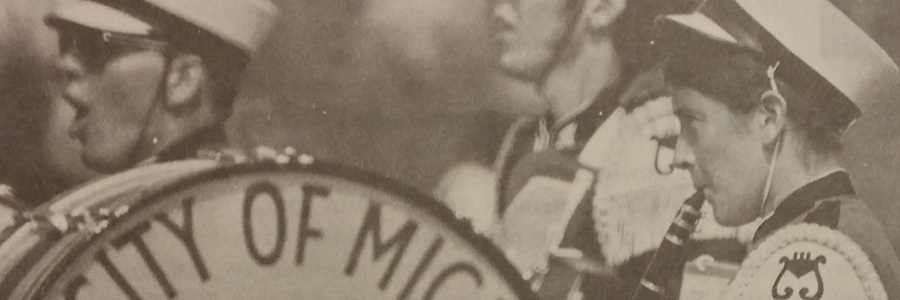In the fall of 1972, the ranks of the Michigan Marching Band (MMB) significantly changed just after the passage that summer of Title IX. Twelve women got their first opportunity to don an MMB uniform and join their male counterparts on the field, with instruments, flags, and batons firmly in hand. But what should have been a shining moment for these new female members was undercut by having to perform “The Stripper” during their first halftime show in the Big House. What’s more, the formation for the song was a woman’s hemline, rising higher and higher.
“It just felt like such poor taste,” remembers Lynn Hansen, ’75, MA’77, who played tenor sax and was the section leader in the MMB that year. “I remember most of us women not feeling very swell about that. But there was this thinking, ‘Don’t make waves. We’ve got to make this work. We can’t be whiners.’”
U-M had officially struck down the MMB’s male-only policy a year earlier in 1971. However, nearly all Big Ten marching bands held firm to their no-female tradition until Title IX, passed 45 years ago this summer, banned sexual discrimination in federally funded education.
For many, including U-M, the male policy was borne out of marching bands’ historically close ties with the Reserve Officers’ Training Corps (ROTC). From 1927 to 1934, when Nicholas Falcone was director of the MMB, ROTC faculty members supervised the band’s drills. This was the all-male military band culture that MMB director William D. Revelli inherited in 1935, and it remained entrenched until his retirement in 1971.
George Cavender—a longtime assistant director under Revelli—next ascended the podium. Though he officially opened the MMB to women in July 1971, evidence shows he was reluctant to institute the change.
During the summer of 1971, when women were technically supposed to be able to join the MMB, an undated memo reportedly made the rounds in the music department, emphasizing the rule that “marching band is required of all male students.” (Male music students who weren’t physically capable of marching, as well as female music students, were often placed in a concert band class that rehearsed during the same time that the MMB practiced.)
Cavender later defended that memo to The Michigan Daily, stating that it was circulated before the policy change. But he also shared his views with the paper that marching involved “more violent physical activity than would be proper for a lady.” He added, “We couldn’t excuse a woman from rehearsals if she had ‘female problems.’”
Nonetheless, a handful of women angled for auditions in 1971. Some (including Hansen) were simply told there were “no spaces open.” Kathleen Gilroy, ’72—the first woman ever granted an MMB audition—was first told she had missed the audition deadline and was given a slot only after complaining that a male friend had scheduled an audition after she had made her request. Eventually, she was allowed to audition, but then was rejected.
“Before the audition, he (Cavender) barely even spoke to me, but afterwards, he kept explaining how ‘physical’ an activity marching was,” Gilroy told The Ann Arbor News at the time. “He also made several references to all of the harassment he has gotten from reporters and women’s liberation advocates.”
In 1972, when the first class of female MMB members were finally allowed to join, their male colleagues’ reactions differed. “All the guys in the alto horns were great,” says Carolyn Good Kibbe, x’73. Yet she also recalls picking up her uniform and hearing male members uttering statements like, “You won’t make it,” and “This is going to be too tough for you.”
Alto horn player Sally Weaver, ’76, vividly remembers a sousaphone player glaring at her like “you shouldn’t be here.’” Worse yet, as they practiced a step-forward-back-turn, he would stare at her and replace the words with curse words. “It had no effect on me,” she says. “It cracked me up.”
And then there were more subtle messages. When construction began on Revelli Hall in the fall of 1972, the blueprints were not altered to accommodate the band’s policy change regarding women, so only one small bathroom with a few stalls was built into the MMB’s new rehearsal hall.
Nonetheless, the first class of MMB women agree that Cavender seemed to adapt to the MMB’s new reality quickly. “Once we were in, he didn’t see it as a bad thing. I don’t think,” says Kibbe. “As long as you didn’t cross him on basic rules for any reason, he had no problem.”
Cavender told The Michigan Daily in July 1972, “When a tradition denies a person his basic rights, then that tradition is made to be broken. I owe every qualified student an opportunity to play in the band if he wants to.”
Jenn McKee, ’93, is a former MMB trombone player and worked for more than a decade as a staff arts reporter for The Ann Arbor News. She is now a freelance writer whose work has appeared in numerous publications.





